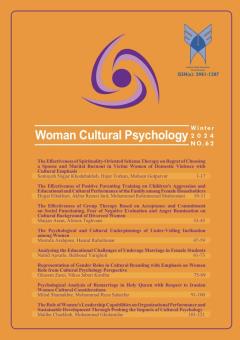Psychological Analysis of Remarriage in Holy Quran with Respect to Iranian Women Cultural Considerations
Subject Areas : Psychology
Milad Shamakhte
1
*
![]() ,
Mohammad Reza Salarifar
2
,
Mohammad Reza Salarifar
2
![]()
1 - PhD Student in Quran and Psychology, Department of Psychology, Quran and Hadith Complex, Al-Mustafa University, Qom, Iran
2 - Associate Professor, Department of Psychology, Faculty of Behavioral Sciences, Hawza and University Research Institute, Qom, Iran
Keywords: Psychology, Remarriage, Holy Quran, Cultural,
Abstract :
The current research was intended to accomplish psychological analysis of remarriage in holy Quran with respect to Iranian women cultural considerations. The research universe embraced all psychologic, cultural references and the holy Quran. The sample encased all texts concerning the psychology and culture of remarriage and the holy Quran. The research method was descriptive analytical. To collect data library method via note taking on index cards of the published references concerning the psychology and culture of remarriage from the holy Quran perspective was imposed. Then the data were assessed by descriptive analytical procedure. The results revealed that culture psychology of the holy Quran had women monogamy indications and proposed some evidences. There were few verses in holy Quran that pointed to some of the prophets’ monogamy. It could be apprehended that the holy Quran culture prioritized monogamy rather than polygamy as a path to peace of mind but, consider the polygamy would be useful in abnormal circumstances. In the polygamy the women would more suffer from the stress and would be more exposed to mental insanity while would have less satisfaction from the family life. In the third verse of the Nesa (women) chapter there is an amendment that express it would be so difficult to exercise equality and justice among the spouses in polygamy since justice is one of the most eminent moral virtue that could be claimed by only very a few humans who enjoyed moral defectlessness. In the Nesa (women) chapter (verse 129) in few of the verses generally is declared the monogamy as the principle ethics.
Abdolmojood, A. A. (2005). Chaharsahmari va tahlil-haye an dar adyan mokhtalef, Polygamy and its analyses in different religions. Translated by Mohammadali Hasani. (2013). Tehran: Hoghoogh Emroz. [Persian] URL: https://www.gisoom.com/book/1940833/%DA%A9%D8%AA%D8%A7%D8%A8-%D8%AA%D8%B9%D8%AF%D8%AF-%D8%B2%D9%88%D8%AC%D8%A7%D8%AA-%D8%AF%D8%B1-%D8%AA%D8%A7%D8%B1%DB%8C%D8%AE-%D9%88-%D8%A7%D8%AF%DB%8C%D8%A7%D9%86/
Al-Harrameli, M. H. (2001). Wasail al-Shi'ah ila Tahsil al-Masail al-Shari'ah. Al-Bayt Institute. Qom: Kongereh. [Persian] URL: https://lib.eshia.ir/11025
Allameh Helli, M. (1967). Kashf al-Murad fi Sharh Tajrid al-I'tiqad, The Unveiling of Intention in the Explanation of Abstract Belief. Beirut: Darolelm. URL: https://lib.eshia.ir/71402/1/3
Doroudi ahy, N. (2002). Imbalance of gender ratios at marriage ages. Population, 13(21), 1-22. [Persian] URL: https://www.sid.ir/paper/419546/fa
Eace, A., & Barbara, B. (2009). Why men don’t listen to women and women can’t read maps? Translated by Nazanin Rashid & Neda Goldar. (2015). Tehran: Asim. [Persian] URL: https://www.iranketab.ir/book/37091-why-men-dont-listen-and-women-
Farahmand, M., & Rizvani, Z. (2018). Family structure and function in monogamous and polygamous families. Applied Sociology, 30(3), 135–154. [Persian] URL: https://doi.org/10.22108/jas.2019.114022.1556 https://jas.ui.ac.ir/article_24047.html
Farbod, M. S. (2009). On Amoli: Family and kinship system. Tehran: Danjeh Publishing. [Persian] URL: https://danjehpub.com/product/%D8%AF%D8%B1%D8%A2%D9%85%D8%AF%DB%8C-%D8%A8%D8%B1-%D8%AE%D8%A7%D9%86%D9%88%D8%A7%D8%AF%D9%87-%D9%88-%D9%86%D8%B8%D8%A7%D9%85-%D8%AE%D9%88%D9%8A%D8%B4%D8%A7%D9%88%D9%86%D8%AF%DB%8C/
Fazlullah, S. M. H. (2011). Islam, women, and a new exploration. Translate by Maryam Moradi. (2015). Qom: Bustan Ketab. [Persian] URL: https://noorlib.ir/book/info/68653/%D8%A7%D8%B3%D9%84%D8%A7%D9%85-%D8%B2%D9%86-%D9%88-%D8%AC%D8%B3%D8%AA%D8%A7%D8%B1%DB%8C-%D8%AA%D8%A7%D8%B2%D9%87
Ibn Sa'd, M. b. S. (2001). Al-Tabaqat al-Kubra. Beirut: Dar al-Sader. URL: https://noorlib.ir/author/1503/%D8%A7%D8%A8%D9%86-%D8%B3%D8%B9%D8%AF-%D9%85%D8%AD%D9%85%D8%AF-%D8%A8%D9%86-%D8%B3%D8%B9%D8%AF
Lebon, G. (1955). History of Islamic and Arab Civilization. Translated by Fakhr Daei Gilani, (2005). Tehran: Scientific. [Persian] URL: https://noorlib.ir/book/info/69482/%D8%AA%D9%85%D8%AF%D9%86-%D8%A7%D8%B3%D9%84%D8%A7%D9%85-%D9%88-%D8%B9%D8%B1%D8%A8
Lotfabadi, K. M. (2006). Scientific methodology of research in psychology and educational sciences in Iran. Tehran: Payame Noor University Publishing. [Persian] URL: https://method.rihu.ac.ir/article_490.html
Mehrizi, M. (2001). Tadad zohjat - Hamayesh Daneshnameh Jahan Islam, Polygamy - Encyclopedia of the World of Islam Conference. Encyclopedia of the World of Islam, 7, 491–494. [Persian] URL: https://www.noormags.ir/view/fa/articlepage/1701565/%D8%AA%D8%B9%D8%AF%D8%AF-%D8%B2%D9%88%D8%AC%D8%A7%D8%AA
Moin, M. (2001). The Language of Moin. Tehran: Zarrin. [Persian] URL: https://www.gisoom.com/book/1463947/%DA%A9%D8%AA%D8%A7%D8%A8-%D9%81%D8%B1%D9%87%D9%86%DA%AF-%D9%85%D8%B9%DB%8C%D9%86-%DB%8C%DA%A9-%D8%AC%D9%84%D8%AF%DB%8C-%D9%81%D8%A7%D8%B1%D8%B3%DB%8C/
Mojahed, A., & Birashk, B. (2003). The status of children's salaries and the safety of mental and religious health in the Khandhamsari district. Iranian Journal of Psychiatry and Clinical Psychology, 9(3), 60–67. URL: https://www.noormags.ir/view/fa/articlepage/212665/%D9%88%D8%B6%D8%B9%DB%8C%D8%AA-%D8%B1%D9%81%D8%AA%D8%A7%D8%B1%DB%8C-%DA%A9%D9%88%D8%AF%DA%A9%D8%A7%D9%86-%D9%88-%D8%B3%D9%84%D8%A7%D9%85%D8%AA-%D8%B1%D9%88%D8%A7%D9%86%DB%8C-%D9%88%D8%A7%D9%84%D8%AF%DB%8C%D9%86-%D8%AF%D8%B1-%D8%AE%D8%A7%D9%86%D9%88%D8%A7%D8%AF%D9%87-%D9%87%D8%A7%DB%8C-%DA%86%D9%86%D8%AF-%D9%87%D9%85%D8%B3%D8%B1%DB%8C
Motahari, M. (2002). Collected Works. Qom: Sadra Publishing, First Edition, [Persian] URL: https://motahari.org/product/%D9%85%D8%AC%D9%85%D9%88%D8%B9%D9%87-%D8%A2%D8%AB%D8%A7%D8%B1-%D8%A7%D8%B3%D8%AA%D8%A7%D8%AF-%D9%85%D8%B7%D9%87%D8%B1%DB%8C-%D8%AC%D9%84%D8%AF-%D8%A7%D9%88%D9%84/
Muhaqqiq al-Karaki, A. H.(1990). Jami‘ al-Maqasid fi Sharh al-Qawa‘id. Qom: Al al-Bayt Foundation for Reviving Heritage, URL: https://fa.wikishia.net/view/%D8%AC%D8%A7%D9%85%D8%B9_%D8%A7%D9%84%D9%85%D9%82%D8%A7%D8%B5%D8%AF_%D9%81%DB%8C_%D8%B4%D8%B1%D8%AD_%D8%A7%D9%84%D9%82%D9%88%D8%A7%D8%B9%D8%AF_(%DA%A9%D8%AA%D8%A7%D8%A8)
Pasandideh, A. (2014). Islamic psychology. Qom: Dar al-Hadith Publishing. [Persian] URL: https://astanbook.ir/product/%D8%B1%D9%88%D8%B4-%D9%81%D9%87%D9%85-%D8%B1%D9%88%D8%A7%D9%86%D8%B4%D9%86%D8%A7%D8%AE%D8%AA%DB%8C-%D9%85%D8%AA%D9%88%D9%86-%D8%AF%DB%8C%D9%86%DB%8C/
Rahmanian, M., Zahirinia, M., & Rostegar, Y. (2023). A phenomenological study of women’s lived experiences in polygamous families. Women’s Social Psychological Studies, 21(4), 101–135. [Persian] URL: https://doi.org/10.22051/jwsps.2023.39764.2595 https://journal.alzahra.ac.ir/article_7467.html?lang=en
Rezaei Isfahani, M. A. (1962). Tafsir Mehr. Qom: Publishing Institute of Quranic Sciences and Interpretations. [Persian]. URL: https://noorlib.ir/book/info/13239/%D8%AA%D9%81%D8%B3%DB%8C%D8%B1-%D9%82%D8%B1%D8%A2%D9%86-%D9%85%D9%87%D8%B1
Rezaei isfahani, M. A., Vashian, A. A., & Koravand, A. (2024). Analyzing the common methods of psychological studies based on the Quran and presenting the optimal method. Quran and Science, 18(34), 9–46. [Persian] URL: https://qve.journals.miu.ac.ir/article_9416.html
Stone, A., & Al-Krenawi, G. (2002). Answers to sexual questions. Translated by Abolfazl Nazari. (2005). Tehran: Samt. [Persian] URL: https://www.gisoom.com/book/1230158/%DA%A9%D8%AA%D8%A7%D8%A8-%D9%BE%D8%A7%D8%B3%D8%AE-%D8%A8%D9%87-%D9%BE%D8%B1%D8%B3%D8%B4%D9%87%D8%A7%DB%8C-%D8%AC%D9%86%D8%B3%DB%8C/
Stone, H., et al. (1997). Responses to sexual and marital issues. Translated by Kazem AliPour. (2002). Tehran: Yadgar. [Persian] URL: https://psybooks.ir/product/%DA%A9%D8%AA%D8%A7%D8%A8-%D9%BE%D8%A7%D8%B3%D8%AE-%D8%A8%D9%87-%D9%85%D8%B3%D8%A7%D8%A6%D9%84-%D8%AC%D9%86%D8%B3%DB%8C-%D9%88-%D8%B2%D9%86%D8%A7%D8%B4%D9%88%DB%8C%DB%8C/
Tabatabaei, S. M. H. (1996). Al-Mizan fi Tafsir al-Quran. Qom: Islamic Publishing Office. URL: https://lib.eshia.ir/50081/4/546/%D8%B3%D9%87
Tabatabai Yazdi, S. M. K. (1979). Al-Urwat al-Wuthqa. Baghdad, Darolfekr. URL: https://lib.eshia.ir/10027/1/2

